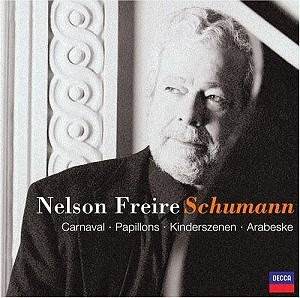In 2002, Nelson Freire
came out of his lengthy hibernation
from the world of recordings with an
exceptional disc of Chopinís Piano Sonata
No. 3 and the Opus 25 Etudes. Now, Decca
has released a Freire disc of four famous
Schumann piano works, and the program
is a varied one. We get the masked ball
of the Carnaval, a mini-Carnaval in
the form of Papillons, the Kreisleriana
that revolves around the adultís perception
of childhood events and dreams, and
the Arabeske which is a relatively abstract
work Schumann wrote to appeal to his
audiences.
Since I know Kinderszenen
like the back of my hand, I decided
to test the Freire waters first with
this work. As many of you know, Kinderszenen
involves Schumann looking back at his
childhood. The adult and child are merged,
and any superb performance has to highlight
the duality of the musicís messages.
This duality immediately takes shape
in the 1st Scene, "Foreign
lands and people", where the adult
takes a long look back at the child
dreaming of foreign worlds through the
adult filter. Freire also immediately
establishes his credentials of investing
each note with wide-eyed wonder and
nostalgia.
Rhythmic vitality and
bounce are the key ingredients to the
2nd Scene titled "Curious
Story". Freireís vitality is as
good as it gets. Antonin Kubalek on
Dorian is more magisterial and others
are more sharply etched, but nobody
surpasses Freire concerning the exuberance
and flow of the music. He is also excellent
in "Catch Me" Ė fast, exciting,
and youthful. "Pleading Child"
receives an equally compelling performance
fully reflecting a naive and self-absorbed
child who never stops asking for what
he wants. At the same time, the adult
is patient and loving.
The 5th
Scene, "Perfect Happiness"
is played by Freire in a highly delicate
yet public manner. "Important Event"
gets Freireís regal treatment, and I
love how he slows down and gradually
softens at the conclusion in the manner
of Wilhelm Kempff on Deutsche Grammophon.
Freireís "Dreaming"
again displays his delicate and peaceful
side in an enchanting interpretation.
His "By the fireside" is light
and playful, as if conveying the flicker
of fire stretching upward. "Knight
of the hobby-horse" requires a
whimsical attitude delivered with a
strong punch, but here I find Freire
a little too forceful.
"Almost too serious"
conveys a host of emotional themes including
mystery, nostalgia, and security in
a pristine setting. This is one of Freireís
best performances on the disc with superb
pacing and inflections. "Being
frightened" goes very well although
the sadness feature could have more
pronounced. Freireís "Slumbering
child" excellently imparts the
pieceís initial melancholy and the subsequent
blissful sleep of the child.
When the twelve Scenes
are complete, Schumann finishes up with
a Postlude, "The poet speaks".
This is such a wonderful conclusion
to the work, as the poet takes center
stage to make sense of it all, to ponder
the connections and disconnects between
adult and child. Freire is perhaps at
his best in the Postlude with incisive
articulation to convey the poetís insight.
Overall, Freireís performance
of Kinderszenen is exceptional. There
are other versions more powerful, ceremonial,
and deep. However, Freire brings an
irresistible combination of lightness
and poignancy to the work with outstanding
rhythmic flow and meaningful spacing
between notes.
With Carnaval, we
enter a very different world of Schumannís
creation. The adult-child connection
is gone, replaced by layers of emotions
impetuously uncovered and displayed
at a masked ball. Given that the shorter
Papillons also involves a masked ball,
Shumann could be said to have had a
little obsession going here. From my
perspective, he didnít feel secure in
simply being himself out in the world.
He created his imaginary alter-egos
in Florestan and Eusebius, two individuals
who displayed the traits Schumann either
would not or could not assume. His masked
balls represent the body of core thoughts
and emotions that he wouldnít dare display
in public. Itís as if there was an entire
person within him dying to get out but
petrified to take the plunge. Fortunately,
Schumann was able to address all these
issues in his music.
Freire is even better
in Carnaval and Papillons than he is
in the Kinderszenen. The sudden shifts
of personality, tempo and dynamics that
are such basic features of Carnaval
and Papillons are like second nature
to Freire. He relishes the architecture
of these two works, and I would be hard
pressed to point to any other recorded
versions of decided superiority.
Arabeske also receives
an outstanding reading. Have you ever
heard more haunting and stunning music
than in the Arabeskeís concluding theme?
I havenít, and the Freire performance
has the most sublime conclusion Iíve
yet to encounter.
I imagine that all
my laudatory comments would place the
new Freire disc in the Ďmust haveí category.
However, there is the issue of sound
quality, and I feel that the engineering
lowers the discís appeal substantially.
The basic problem is an overly rich
soundstage lacking definition and clarity.
When an ancient Benno Moiseiwitsch recording
conveys greater detail and shape than
the Freire disc, you know that something
is amiss. I have the distinct feeling
that I am not hearing everything Freire
brings to his performances. All I can
say is that Decca has traditionally
favored rich sound at the expense of
clarity and still has trouble getting
it right. That Freireís performances
come across so well is a tribute to
his artistry.
In conclusion, I recommend
Nelson Freireís new Schumann recording
with the reservations expressed about
the soundstage. I also strongly advise
interested readers to check out the
sound before deciding to acquire the
disc, although Freire enthusiasts should
love the performances, sound deficiencies
or not.
Don Satz
